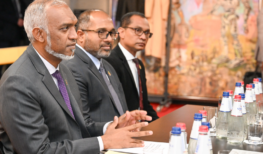Gov’t Unveils 2024-2028 Medium-Term Revenue Strategy

The Ministry of Finance has launched an extensive Medium-Term Revenue Strategy (MMTRS) for the period 2024-2028, aiming to fortify fiscal sustainability, boost domestic revenue mobilisation, and reduce dependence on external borrowing.
The strategy, articulated in a detailed report, encompasses a broad array of reforms designed to modernise the revenue system, enhance tax compliance, and ensure the country’s long-term financial stability.
Economic Context and Rationale
The Maldives’ economy has experienced robust growth over the past decades, predominantly driven by the tourism sector, which directly contributed 20.4 per cent to the GDP in 2022. However, the country’s economic dependency on tourism was starkly exposed during the COVID-19 pandemic, which led to a sharp decline in government revenue by 34.5 per cent in 2020 compared to 2019.
In light of these vulnerabilities, the MMTRS sets ambitious targets to improve the revenue-to-GDP ratio from the current 32.5 per cent to at least 35.5 per cent by 2028. This aligns with the principles outlined in the Fiscal Responsibility Act and aims to enhance fiscal sustainability, public welfare, economic competitiveness, and climate resilience.
Strategic Outcomes and Objectives
The MMTRS has outlined several strategic outcomes to be achieved by the end of 2028:
1. Increase Fiscal Sustainability: By raising the revenue-to-GDP ratio, the strategy aims to ensure the government can meet its financial obligations without excessive borrowing.
2. Enhance Economic Competitiveness and Public Welfare: Improved revenue mobilisation will support public services and infrastructure, contributing to overall economic growth and quality of life.
3. Strengthen Climate Resilience: The strategy includes measures to support environmental sustainability, such as the monetisation of carbon credits.
Key Policy and Administrative Reforms
The MMTRS introduces a series of policy reforms and administrative measures designed to enhance revenue collection and streamline tax administration:
Tax Policy Reforms
1. Indirect Taxes:
• Broadening the GST base and formulating an excise tax regime.
• Reviewing export-import duties and adjusting rates for airport taxes, green tax, and GST.
2. Direct Taxes:
• Enhancing the progressivity of the income tax system and introducing a presumptive tax regime.
• Reviewing tourism land rent and formulating an infrastructure fee.
3. Other Revenues:
• Introducing measures such as the monetisation of carbon credits and reviewing vehicle and vessel fees.
Revenue Administration Reforms
1. Strengthening Compliance Risk Management:
• Applying and refining the compliance risk management (CRM) framework for large taxpayers and enhancing GST compliance efforts.
• Developing electronic processes for vendor collections and improving data management needs.
2. Workforce Development and Institutional Strengthening:
• Implementing training plans for staff development, including specialty expertise in IT and data analytics.
• Upgrading IT systems based on future business requirements and establishing a performance measurement framework.
Legislative Revisions
To support these policy changes, the MMTRS includes significant legislative revisions, such as amendments to the Tax Administration Act, Income Tax Act, and GST Act. The strategy also proposes new legislation, including a property tax framework and regulations for monetising carbon credits.
Governance and Implementation
The MMTRS will be governed by a robust framework involving a Steering Committee, Secretariat, and Working Groups, ensuring coordinated policy implementation across various stakeholders, including government ministries, industry groups, and the public. Key governance elements include:
1. Consultation and Communication:
• Engaging stakeholders at every stage, from design to implementation, through regular feedback and a communication strategy.
2. Support and Commitment:
• Securing strong cross-government commitment, particularly from the executive and legislative branches, to ensure the successful implementation of revenue reforms.
3. Monitoring and Evaluation:
• Establishing a systematic approach for tracking progress and assessing the achievement of objectives, with Working Groups reporting to the Steering Committee.
Capacity Development
The strategy recognises the need for substantial investment in technology and human resources. It outlines a capacity development programme to ensure the required skills and infrastructure are in place, supported by both budget allocations and external resources from donor agencies.
The MMTRS aims to provide a comprehensive and coherent approach to revenue system reform, fostering public consensus and ensuring fiscal stability. By adhering to principles of neutrality, reliability, responsiveness, equity, and feasibility, the strategy sets a clear direction for the Maldives’ fiscal policy over the medium term.
Through the successful implementation of the MMTRS, the Maldives seeks to reduce its reliance on external borrowing, manage public finances more effectively, and achieve broader social and developmental goals, ultimately contributing to a more resilient and self-sufficient economy.






